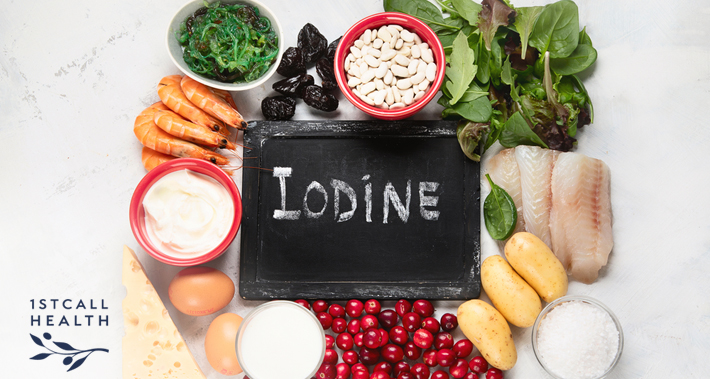
Your thyroid is involved in just about everything your body does.
The thyroid gland supports many of your body’s functions, including blood circulation, breathing, and digestion.
In addition, the hormones produced by your thyroid fuel your metabolism – the process your cells use to create energy.
Thyroid issues can have major impacts on your energy and overall health.
At our DC primary care clinic, we’re all about sustainable wellness solutions to help you stay healthy and strong.
So far on this blog, we’ve looked at your bladder, adrenal glands, kidneys, and liver.
Today, it’s your thyroid’s turn.
What Is Your Thyroid?
Your thyroid is a butterfly shaped gland located in your throat, behind your trachea – also known as your windpipe.
It’s made up of two lobes that are connected by a band of tissue called the isthmus.
The body of your thyroid contains thyrocytes, or follicle cells, and C cells.
Thyrocytes create and store thyroid hormones, and C cells release the hormone calcitonin.
The thyroid gland may be small, but it plays an important role in your endocrine system.
Your endocrine system is a network of glands that make and release hormones.
You have many glands throughout your body – they make hormones, sweat, tears, and even your digestive juices.
What puts your endocrine glands apart is that they produce hormones.
These hormones enter your bloodstream to regulate various bodily functions.
Your hormones are chemical messengers that stimulate your organs and other tissues to trigger different processes.
Your thyroid produces and releases important hormones and is responsible for regulating your metabolism.
Other endocrine glands include your pancreas, pituitary gland, adrenal glands, hypothalamus, parathyroid gland, thymus, pineal gland, and gonads.
What Are The Functions Of Your Thyroid?
Your thyroid is kind of like the curious toddler of your endocrine system.
It gets into everything, and needs the guidance of a smart, stabilizing body part.
Your thyroid is regulated by your hypothalamus, a deep part of your brain, with the help of your pituitary gland.
Your hypothalamus’s job is to keep your body in a state of chemical balance called homeostasis.
Hormones bring information to your hypothalamus and it responds by releasing other hormones to start and stop various processes.
The pituitary is the hypothalamus’s number one gland for getting things done in the endocrine system.
The hypothalamus sends hormonal prompts to the pituitary gland, which is located just below the brain.
The pituitary gland then sends out TSH, or thyroid stimulating hormone, to activate the thyroid gland.
TSH reaches the receptor cells all over your thyroid gland, prompting it to produce and release various hormones.
Your thyroid gland and thyroid hormones impact most of your organ systems, including:
- Your cardiovascular system
- Your digestive system
- Your nervous system
- Your reproductive system
Your Cardiovascular System
Your thyroid helps control your cardiac output, or how much blood your heart pumps into your circulatory system.
Your thyroid also impacts your heart rate – how fast your heart beats – and how well your heart contracts.
Your Digestive System
Your thyroid affects how your digestive system moves food through your body, also known as your gastrointestinal motility.
Your Nervous System
Your thyroid impacts both your physical sensation and your mood as it interacts with your nervous system.
Dysfunction in your thyroid can lead to pain, numbness, tingling, or burning sensations in different parts of your body.
In addition, an underactive thyroid can cause depression, while an overactive thyroid can cause anxiety.
Your Reproductive System
The thyroid also has an impact on reproductive health.
An irregular period, for example, may be a sign that your thyroid isn’t functioning properly.
Thyroid issues can also have impacts on fertility.
What Are Thyroid Hormones?
But how can one little gland do all this?
The cells in your body – every single one – depend on the hormones produced by your thyroid to convert oxygen into energy.
This conversion process is also known as metabolism.
At the cellular level, it’s how your body keeps all your systems going.
To make the hormones used in metabolism, your thyroid combines iodine and tyrosine, an amino acid, from your bloodstream.
Iodine and tyrosine combine to produce the hormones triiodothyronine (T3) and thyroxine (T4).
Triiodothyronine (T3)
T3 supports your brain function and development, heart function, digestion, and muscle control.
Triiodothyronine is produced by your thyroid gland, but it can also be produced in other tissues.
An enzyme reaction causes a process called deiodination, which converts thyroxine into triiodothyronine.
Too much or too little T3 in your blood stream can lead to hyperthyroidism or hypothyroidism.
Thyroxine (T4)
T4 is the main hormone that your thyroid produces and secretes.
Once your thyroid releases thyroxine into your bloodstream it travels to various organs like your liver and kidneys.
In your organs thyroxine goes through a process called deiodination, converting it into triiodothyronine.
Thyroxine is essential for your brain development, bone health, digestive function, metabolism, and muscle control.
Too much thyroxine in your system can lead to thyrotoxicosis, which can result in:
- Goiter, or swelling of the neck
- Increased bowel movements
- Weight loss
- Chronic fatigue
- Irritability
- Irregular menstrual cycle
- Increased sensitivity to heat
Thyrotoxicosis can be caused by hyperthyroidism, thyroiditis (inflammation of the thyroid) or tumors in the thyroid gland.
A lack of thyroxine in your system is known as hypothyroidism.
In adults, low thyroxine can lead to weight gain, memory problems, infertility, fatigue, and muscle stiffness.
Low thyroxine in children can lead to developmental issues.
Common Thyroid Issues
Thyroid issues are very common, and there are many different types of thyroid disease.
If you were assigned female at birth, you’re at greater risk of thyroid issues.
However, anybody of any gender can experience them.
Thyroid issues generally show up in adulthood, after the age of about 30, though they can sometimes be present from birth.
Early symptoms of thyroid problems include:
- Slow or rapid heart rate
- Unexplained weight loss or weight gain
- Difficulty tolerating cold or heat
- Depression or anxiety
- Irregular menstruation
Thyroid diseases can be split up into two types based on where the issue starts.
Primary thyroid diseases are issues that arise in the thyroid gland itself.
Secondary thyroid diseases start out in the pituitary gland and affect how it stimulates your thyroid.
Let’s take a look at them.
1. Hyperthyroidism
Hyperthyroidism occurs when your thyroid gland is overactive – when it produces too much of the T3 and T4 hormones.
Symptoms of hyperthyroidism may include:
- Elevated heart rate
- Excessive sweating
- Appetite changes
- Trouble sleeping
- Rapid weight loss
- Hand tremors
- Anxiety or nervousness
Hyperthyroidism can be a primary or secondary thyroid disease caused by:
- Graves’ disease
- Thyroid nodules
- Thyroiditis
- Post pregnancy thyroid inflammation
- Eating too much iodine
- Over treatment of hypothyroidism
- Benign tumor on the pituitary gland
2. Graves’ Disease
Graves’ disease is the most common cause of hyperthyroidism.
Graves’ disease is an autoimmune disease – your immune system creates antibodies that overstimulate your thyroid gland.
The immune system produces thyroid stimulating immunoglobulins, or TSIs.
TSIs then bind to receptor cells of your thyroid that usually respond to TSH signals from your pituitary gland.
The TSIs interrupt the chain of command from your hypothalamus to your thyroid.
In doing so, the TSIs trick your thyroid into producing too much thyroid hormone, which leads to hyperthyroidism.
The symptoms of Graves’ disease include symptoms of hyperthyroidism, as well as:
- Chest pain or palpitations
- Difficulty breathing
- Difficulty managing diabetes
- Muscle weakness
- Restlessness
- Reduced libido
- Sweating
- Vitamin B12 deficiency
3. Hypothyroidism
Hypothyroidism occurs when your thyroid gland is unable to make enough T3 and T4.
As a result of thyroid hormone deficiency, people with hypothyroidism see symptoms linked to slow metabolism.
Symptoms of hypothyroidism include:
- Weight gain or difficulty losing weight
- Weakness and fatigue
- Hair loss
- Dryness or coarseness of the skin or hair
- Muscle pain and cramps
- Memory loss
- Intolerance to cold temperatures
- Depression
- Constipation
- Irritability
Causes of hypothyroidism include congenital or autoimmune disease, inflammation, and iodine or TSH deficiency.
4. Hashimoto’s Thyroiditis
Hashimoto’s thyroiditis is a disorder in which the immune system fails to recognize the thyroid gland and attacks it.
These immune attacks cause inflammation that limits the thyroid gland’s ability to make hormones.
Hashimoto’s thyroiditis is also known as Hashimoto’s disease, chronic lymphocytic thyroiditis, and autoimmune thyroiditis.
Hashimoto’s thyroiditis is the most common cause of hypothyroidism.
5. Thyroid Cancer
Thyroid cancer most often appears as a small, solid mass, like a nodule or small tumor, in the thyroid gland.
There are many different types of thyroid cancer.
Most cases occur in adults over the age of 30 and can be treated successfully.
In older adults, thyroid cancer can be more aggressive.
Papillary thyroid cancer accounts for between 80 and 85% of all cases of thyroid cancer.
In addition to being the most common type of thyroid cancer, it is also one of the most treatable types of cancer.
Follicular thyroid cancer is more aggressive than papillary thyroid cancer.
Accounting for 10 to 15% of all cases, follicular thyroid cancer can enter the bloodstream and spread to other parts of the body.
Medullary thyroid cancer and anaplastic thyroid cancer each account for about 2% of all cases of thyroid cancer.
Medullary thyroid cancer often spreads to lymph nodes.
Anaplastic cancer is a persistent and aggressive form of thyroid cancer that can become resistant to chemotherapy.
How To Keep Your Thyroid Healthy
A healthy, well functioning thyroid is one that responds to TSH, produces enough T3 and T4, and supports your chemical balance.
You can improve or maintain your thyroid gland’s function through exercise, diet, and stress management.
Keep reading below for tips on how to optimize your thyroid health through healthy eating.

1. Eat Foods Rich In Iodine
Iodine is a key component of the thyroid hormones triiodothyronine and thyroxine.
Your body doesn’t naturally produce its own iodine, but most people get enough iodine in their diet.
Iodized table salt and other iodine fortified foods are a primary source of iodine for most people.
However, most people already eat too much salt in their diet.
So here are a few healthier sources of iodine to include in your diet:
- Animal protein like cheese, milk, yogurt, and eggs
- Seafood like saltwater fish and shellfish
- Seaweed and other sea vegetables
- Soy products like soy milk
Be mindful not to overdo it when consuming iodine – too much can also cause problems.
2. Eat Foods Rich In Selenium
In addition to fueling your metabolism, your thyroid is also part of the antioxidant systems that maintain cell health.
Selenium supports your thyroid function, particularly when it comes to its antioxidant functions.
Foods that are rich in selenium include:
- Certain types of fish, like tuna and halibut
- Brazil nuts
- Enriched grains and cereals
- Brown rice and oats
- Beef, turkey, beef liver, and chicken
- Cottage cheese and yogurt
3. Eat Foods Rich in Probiotics
Probiotics are bacteria that encourage good gut health.
You can get probiotics into your system by fermented foods.
Clinical studies show a strong correlation between consuming probiotics and thyroid health.
The exact mechanism is still unclear, but the evidence shows that healthy gut bacteria can improve your thyroid function.
Some sources of probiotics to try out:
- Kefir, a drink made by adding yeast and bacteria to milk
- Kombucha, a fizzy, fermented tea drink
- Yogurt
- Sauerkraut, fermented shredded cabbage popular in Eastern Europe
- Kimchi, a Korean side dish often made from cabbage
- Salt preserved pickles – but not pickles made with vinegar
- Miso, fermented soybean paste often eaten in soup in Japan
- Tempeh, a nutty, slightly tangy fermented soybean product
Eat Foods Rich In B12
Vitamin B12 increases your metabolism, supports red blood cell production, and boosts your nervous system.
All these factors mean that supplementing your B12 intake can also support T3 and T4 production.
Vitamin B12 can be found in many animal based foods like fish, meat, poultry, and dairy.
You can also get B12 from fortified breakfast cereal and nutritional yeast.
Book Your Appointment With 1stCallHealth Today
From the hair on your head right down to your cells, proper thyroid function is essential to your health.
Symptoms like sudden weight changes, fatigue, and sweating or chills, might mean it’s time to get your thyroid checked out.
Here at 1stCallHealth, we offer affordable primary care services to residents of DC, Maryland, and Virginia.
To understand your thyroid health and improve your thyroid function, book your appointment with 1stCallHealth today.
1stCallHEALTH
1331 H St NW Ste 200,
Washington, DC 20005
(202) 590-0009
– https://goo.gl/maps/MVhjkz2jqynWpsgo6
1stCallHEALTH provides affordable access to primary care services. We believe that everyone deserves affordable, high quality primary care.
Our vision is to challenge the status quo, focus on the individual, and empower personal control to change the way we think about healthcare.




